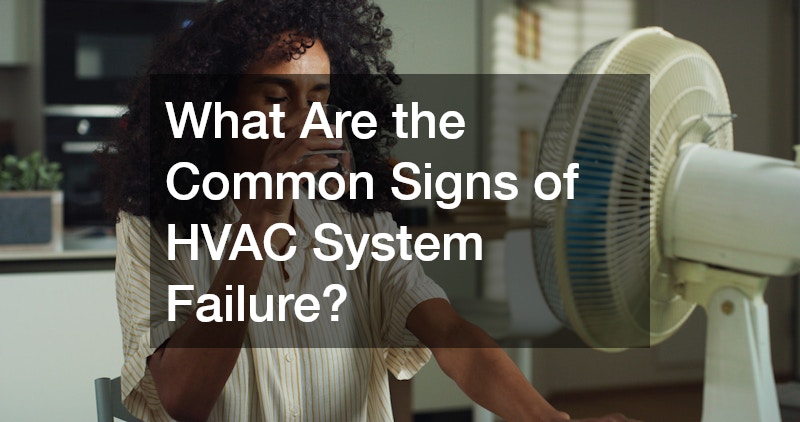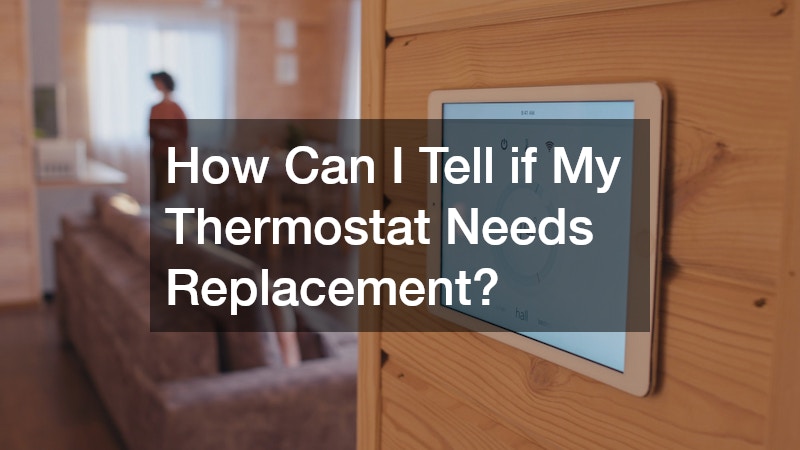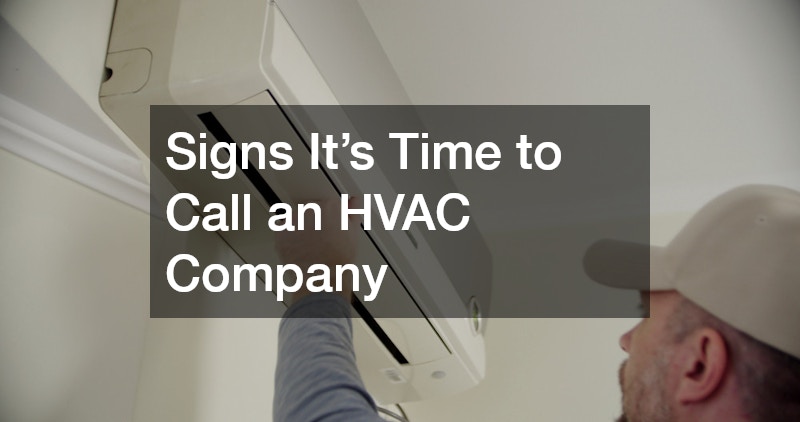Maintaining a comfortable home environment relies heavily on the proper functioning of your heating and cooling systems. Whether you rely on central air, heat pumps, or a combination of systems, understanding when it’s time to call an HVAC company is critical for efficiency, safety, and cost savings. Homeowners often overlook subtle signs of system malfunction until they become significant problems. By recognizing early indicators of trouble, you can prevent major repairs, reduce energy bills, and avoid unexpected breakdowns. You can also avoid having to call on a carpet company to help you battle cold floors.
What Are the Common Signs of HVAC System Failure?

Unusual Noises Coming From the Unit
One of the first signs that your HVAC system needs attention is unusual noises. A humming sound might indicate electrical issues, while banging or clanking can signal loose components within the system. Whistling noises may point to air leaks in the ductwork or problems with your fan motor. Promptly addressing these sounds by contacting an HVAC contractor can prevent further damage and costly repairs. An HVAC company can inspect the system thoroughly, identify the source of the noise, and recommend necessary repairs or replacements. Regular AC maintenance can also help reduce these occurrences by keeping all components functioning smoothly.
Poor Airflow in Your Home
Inefficient airflow can make certain areas of your home uncomfortable. If some rooms remain too hot or too cold, it might indicate a clogged filter, blocked vents, or failing components. An HVAC company can assess your system and ensure your air conditioning services are operating correctly. Addressing airflow issues early not only improves comfort but also prevents overworking the system, which could lead to premature failure. Poor airflow can sometimes be related to the ductwork or even the heating oil system if your home has hybrid heating. Regular inspections and maintenance can catch these issues before they escalate.
Frequent Cycling of the HVAC System
When your HVAC system turns on and off more often than usual, it could be a sign of malfunction. Frequent cycling increases wear and tear and affects efficiency. An HVAC company can diagnose whether the problem stems from thermostat issues, electrical faults, or other mechanical failures. Scheduling routine AC maintenance can prevent frequent cycling by ensuring all parts are functioning properly and your system operates at peak efficiency. Over time, ignoring frequent cycling may lead to more serious mechanical failures.
How Do I Know if My HVAC System Is Inefficient?
Rising Energy Bills Without a Change in Usage
A sudden spike in energy costs can indicate an inefficient HVAC system. Even if your household usage remains consistent, an older or malfunctioning system may consume more power. Consulting an HVAC company to evaluate your setup can reveal underlying problems. Energy-efficient upgrades, including new air conditioning services or heating repair adjustments, can lower your monthly bills and improve overall comfort. Detecting inefficiency early can also help you plan for system replacement if needed. Sometimes, small adjustments like cleaning coils or replacing filters can make a significant difference.
Inconsistent Temperatures Throughout the Home
If temperatures vary significantly between rooms, your HVAC system may not be distributing air properly. Uneven temperatures can stem from ductwork leaks, insufficient insulation, or a system that is no longer adequate for your home size. A skilled HVAC contractor can identify the root cause and provide solutions such as duct repairs, system balancing, or component replacement. Addressing these inconsistencies improves comfort for all occupants. It also prevents unnecessary strain on the HVAC system, reducing wear and tear.
Age of the HVAC System
Most HVAC systems have a lifespan of 10 to 15 years. As systems age, they become less efficient and more prone to failure. Regular inspections by an HVAC company can help you monitor system performance and determine when replacement might be more cost-effective than continued repairs. Even a well-maintained system eventually reaches the point where modern AC installation and air conditioning services offer significant efficiency benefits. Older systems may also struggle to meet current energy standards. Replacing an aging unit can provide greater comfort and lower long-term operating costs.
What Should I Do if My HVAC System Smells Bad?
Identifying the Type of Odor
Different smells can indicate various issues. A musty odor may suggest mold growth in the ducts, while a burning smell could signal electrical problems or overheating components. Identifying the source is crucial for safety and comfort. Promptly addressing unusual odors helps prevent health risks. Professional evaluation ensures accurate diagnosis. Early detection of smells also protects your HVAC system from further damage.
Understanding Potential Hazards of Different Smells
Some odors, such as gas or chemical smells, can indicate dangerous leaks. Prompt action is essential to prevent health risks. An HVAC company can inspect the system and address the hazards effectively. Ignoring hazardous odors can lead to serious accidents. Understanding the type of smell helps prioritize urgency. Safety should always be the top concern when dealing with HVAC issues.
When to Call a Professional to Investigate
Persistent or unusual odors always warrant professional attention. An HVAC contractor can perform a thorough inspection, identify the cause, and recommend proper remedies, whether through heating repair, AC maintenance, or duct cleaning. Timely intervention prevents system damage. It also ensures the indoor environment remains safe and comfortable. Professionals can provide long-term solutions to eliminate recurring odors.
How Can I Tell if My Thermostat Needs Replacement?

Inaccurate Temperature Readings
If your thermostat displays temperatures different from the actual room temperature, it may need recalibration or replacement. This can cause inefficient heating or cooling and increase energy bills. An HVAC company can test the thermostat and provide the necessary updates or replacements. Ensuring accurate temperature readings maintains comfort. It also improves energy efficiency by preventing overuse. Timely replacement prevents further HVAC system stress.
Non-Responsive Controls
Thermostats that fail to respond to changes in settings can indicate wiring problems or internal failures. Professional evaluation ensures your HVAC system functions as intended and integrates properly with AC installation or air conditioning services. Non-responsive controls may also affect system scheduling. Addressing these issues prevents unnecessary wear. A functioning thermostat is key to maintaining optimal indoor conditions. Professional repair or replacement restores full control of your HVAC system.
Compatibility Issues With a New HVAC System
When upgrading to a modern system, your old thermostat may not be compatible. An HVAC contractor can recommend suitable models and ensure seamless integration with heating repair and other services, maintaining efficiency and comfort. Using incompatible controls can lead to system inefficiency. Professionals can guide you in selecting a model that maximizes performance. Proper integration avoids technical issues. It ensures that your new HVAC system operates reliably from day one.
What Are the Signs of Refrigerant Leaks?
Reduced Cooling Efficiency
If your system struggles to cool the home adequately, it may be low on refrigerant due to leaks. An HVAC company can locate and repair leaks, refill the refrigerant, and restore optimal performance. Low refrigerant can also strain the compressor. Addressing leaks early prevents larger, more expensive repairs. Maintaining proper refrigerant levels ensures consistent cooling. Regular inspections help detect leaks before they impact efficiency.
Frost Formation on the Coils
Ice or frost buildup on the evaporator coils can indicate a refrigerant leak or airflow issues. Immediate attention by an HVAC contractor prevents further damage and system failure. Frost can also reduce airflow efficiency. Ignoring this issue may lead to complete system breakdown. Timely service maintains performance and prolongs system life. It also ensures energy-efficient operation.
Bubbling or Hissing Noises
Audible hissing or bubbling can signal a refrigerant leak. Ignoring these signs may compromise system efficiency and cause costly repairs. HVAC companies are equipped to diagnose and correct these problems safely. Such noises should never be overlooked. Prompt action prevents further mechanical damage. Professional handling ensures safe refrigerant management and optimal system function.
When Is the Right Time to Schedule Routine Maintenance?
Seasonal Check-Ups
Scheduling maintenance before summer and winter ensures your HVAC system operates efficiently during peak seasons. Routine inspections include AC maintenance, heating repair, and evaluating air conditioning services. Seasonal check-ups can detect minor issues before they become major problems. This proactive approach improves comfort and system reliability. Regular service also extends equipment lifespan. It helps maintain energy efficiency throughout the year.
Before Extreme Temperature Changes
Preparing your system for extreme weather prevents breakdowns and extends equipment lifespan. HVAC companies can perform comprehensive inspections and necessary adjustments. Seasonal changes put additional stress on HVAC systems. Early preparation ensures smooth operation during temperature extremes. It also reduces the likelihood of emergency repairs. Professional service maximizes system efficiency and reliability.
How Can I Identify Ductwork Problems?

Uneven Airflow in Different Rooms
Inconsistent airflow often points to duct blockages or leaks. An HVAC company can inspect and repair ducts, enhancing overall system efficiency and comfort. Uneven airflow can lead to hot or cold spots. Addressing duct problems improves energy efficiency. Proper duct function ensures consistent indoor temperatures. Professional inspection identifies and resolves issues effectively.
Rising Energy Costs Due to Leaks
Air leaks in ductwork force the HVAC system to work harder, increasing energy consumption. Professional evaluation and repair can reduce costs significantly. Leaks also shorten system lifespan. Timely repairs improve efficiency. Detecting leaks early prevents long-term damage. Properly sealed ducts optimize HVAC performance and energy use.
Unusual Sounds From Ductwork
Rattling, banging, or whistling noises in ducts may indicate loose fittings or blockages. An HVAC contractor can pinpoint the problem and restore smooth airflow. Ignoring unusual sounds can cause further damage. Early detection ensures quieter operation. Proper repairs enhance system performance. Duct noise management contributes to overall comfort and efficiency.
What Health Signs Indicate HVAC Issues?
Increased Allergy Symptoms Indoors
Poor air quality from clogged filters or mold in the system can trigger allergies. HVAC companies can perform cleaning and maintenance to improve indoor air quality. Addressing these issues reduces irritation for occupants. Regular maintenance prevents buildup of allergens. Clean systems contribute to healthier living spaces. Timely service protects both system performance and occupant health.
Lingering Odors and Unusual Air Quality
Persistent odors or dusty, stale air can indicate neglected AC maintenance or duct problems. Professional inspections help maintain a healthy environment. Lingering odors can be a sign of hidden mold or debris. Early intervention improves comfort and air quality. Maintaining clean airflow prevents respiratory issues. HVAC contractors can implement long-term solutions to sustain indoor health.
Presence of Mold or Mildew
Visible mold in vents or around the HVAC system poses health risks. A professional HVAC contractor can remove mold safely and implement preventive measures. Mold growth can spread quickly if left untreated. Prompt action protects both health and system efficiency. Proper cleaning ensures indoor air remains safe. Professionals also recommend ongoing maintenance to prevent recurrence.
How Do I Know If My HVAC System Is Too Old?
Age Recommendations From Manufacturers
Manufacturers often suggest replacing systems after 10 to 15 years. Even with regular maintenance, older systems lose efficiency and reliability. HVAC companies can provide expert advice on replacement timing. Upgrading at the right time prevents unexpected breakdowns. Older units may not meet current energy standards. Professional guidance ensures investment in a reliable system.
Decreased Performance Over Time
Slower cooling, inconsistent heating, and higher energy consumption are signs of aging systems. A professional HVAC contractor can evaluate performance and suggest necessary upgrades. Reduced performance can affect comfort and utility costs. Timely replacement ensures efficient operation. Modern systems often provide superior performance and reliability. Consulting experts allows informed decision-making about upgrades.
When Should I Upgrade My HVAC System?

Benefits of Newer, Energy-Efficient Models
Modern systems offer improved efficiency, quieter operation, and better environmental performance. Upgrading can reduce energy costs and enhance comfort. An HVAC company can guide you through AC installation and integration with existing systems, including water heater installation or heating oil adjustments. Energy-efficient models also provide better air filtration and humidity control. Reduced energy consumption benefits both your wallet and the environment. New systems often include advanced features for greater convenience and comfort.
Evaluating Repair Costs Versus Replacement Costs
When repair expenses approach the cost of a new system, replacement is often the smarter choice. HVAC contractors can provide detailed comparisons and recommendations to help you determine the best course of action. Repeated repairs can become costly and inconvenient, especially if your home’s overall insulation or roofing contributes to heating and cooling loss. Consulting both an HVAC company and a reputable roofing company ensures that any drafts, leaks, or poor insulation aren’t undermining system efficiency. A new system offers long-term reliability and reduced utility costs when paired with proper roof maintenance. Professional evaluation ensures you make a financially sound decision. Balancing immediate needs with future savings is key to optimal HVAC and home energy management.
Recognizing the signs that indicate it might be time to call an HVAC company ensures your home remains comfortable, safe, and efficient. Regular inspections, AC maintenance, and timely repairs can extend system life, improve energy efficiency, and prevent costly breakdowns. From unusual noises and inconsistent airflow to thermostat issues, refrigerant leaks, duct problems, and aging systems, understanding these indicators helps you make informed decisions. Understanding your system’s needs allows you to enjoy a consistent, comfortable indoor climate. Ultimately, regular care and expert support keep your home safe, efficient, and pleasant for years to come.


